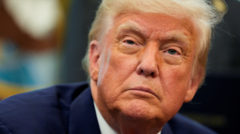The proposal has reignited longstanding tensions between India and Pakistan, with India's government facing scrutiny over its diplomatic stance.
Trump's Mediation Proposal on Kashmir Stirs Controversy in India

Trump's Mediation Proposal on Kashmir Stirs Controversy in India
Former President Donald Trump’s recent mediation offer on the Kashmir conflict poses challenges for Indian leadership, traditionally reluctant to accept third-party intervention.
Trump's announcement urging both nations toward a ceasefire has thrown India’s foreign policy into disarray, igniting debate over the future of Kashmir negotiations while weighing the balance of international relations.
India's foreign ministry has long stood against third-party mediation, a stance reaffirmed in light of Trump’s recent social media posts, which announced a "full and immediate ceasefire" between India and Pakistan following a period of intense military clashes along the Line of Control. Trump hinted at working with both countries to find a resolution to the Kashmir issue, a move that has intensified concerns within India, where any suggestion of external mediation is considered taboo.
The Kashmir conflict, a legacy of the 1947 partition, has persisted for decades, with both India and Pakistan claiming rights to the region. In recent months, tensions escalated after India conducted airstrikes in Pakistani territory following a terrorist attack that killed 26 people, triggering reciprocal military action.
Experts and former officials in India acknowledge the complications Trump’s comments introduce. "This will not be welcomed by the Indian side. It contradicts our longstanding diplomatic policy," said Shyam Saran, former Indian foreign secretary. Meanwhile, amid complications associated with the recent ceasefire, criticism has emerged from India’s opposition, with the Congress party seeking clarity on potential diplomatic shifts.
India has historically viewed Kashmir as an integral part of its territory, bolstered by the 1972 Simla Agreement which stresses bilateral dialogue to resolve differences. However, increased insurgency and tensions in the region have hampered meaningful dialogue.
The Indian government’s response has been cautious, with Foreign Minister Subrahmanyam Jaishankar reiterating India's unwavering stance against terrorism. However, his comments fail to provide a clear indicator of a willingness to engage in discussions initiated by the United States.
Conversely, analysts in Pakistan have embraced Trump’s overture, arguing that external mediation could facilitate constructive discourse amid distrust between India and Pakistan. The view from Islamabad suggests that third-party involvement has gained traction due to India's past rejections of bilateral engagement.
India's relationship with the U.S. complicates the situation further, as Washington has evolved into a strategic partner for New Delhi, particularly as both enter long-term partnerships aimed at countering China's growing influence in the Indo-Pacific region. While Trump's remarks introduce a fresh challenge for Modi's government, they also signify a critical juncture for India as it navigates complex geopolitical waters, balancing national sovereignty with the necessity of maintaining strong international ties.
As the situation develops, India's leadership stands at a crossroads, grappling with both domestic pressures and international expectations in addressing the contentious Kashmir issue.
India's foreign ministry has long stood against third-party mediation, a stance reaffirmed in light of Trump’s recent social media posts, which announced a "full and immediate ceasefire" between India and Pakistan following a period of intense military clashes along the Line of Control. Trump hinted at working with both countries to find a resolution to the Kashmir issue, a move that has intensified concerns within India, where any suggestion of external mediation is considered taboo.
The Kashmir conflict, a legacy of the 1947 partition, has persisted for decades, with both India and Pakistan claiming rights to the region. In recent months, tensions escalated after India conducted airstrikes in Pakistani territory following a terrorist attack that killed 26 people, triggering reciprocal military action.
Experts and former officials in India acknowledge the complications Trump’s comments introduce. "This will not be welcomed by the Indian side. It contradicts our longstanding diplomatic policy," said Shyam Saran, former Indian foreign secretary. Meanwhile, amid complications associated with the recent ceasefire, criticism has emerged from India’s opposition, with the Congress party seeking clarity on potential diplomatic shifts.
India has historically viewed Kashmir as an integral part of its territory, bolstered by the 1972 Simla Agreement which stresses bilateral dialogue to resolve differences. However, increased insurgency and tensions in the region have hampered meaningful dialogue.
The Indian government’s response has been cautious, with Foreign Minister Subrahmanyam Jaishankar reiterating India's unwavering stance against terrorism. However, his comments fail to provide a clear indicator of a willingness to engage in discussions initiated by the United States.
Conversely, analysts in Pakistan have embraced Trump’s overture, arguing that external mediation could facilitate constructive discourse amid distrust between India and Pakistan. The view from Islamabad suggests that third-party involvement has gained traction due to India's past rejections of bilateral engagement.
India's relationship with the U.S. complicates the situation further, as Washington has evolved into a strategic partner for New Delhi, particularly as both enter long-term partnerships aimed at countering China's growing influence in the Indo-Pacific region. While Trump's remarks introduce a fresh challenge for Modi's government, they also signify a critical juncture for India as it navigates complex geopolitical waters, balancing national sovereignty with the necessity of maintaining strong international ties.
As the situation develops, India's leadership stands at a crossroads, grappling with both domestic pressures and international expectations in addressing the contentious Kashmir issue.





















